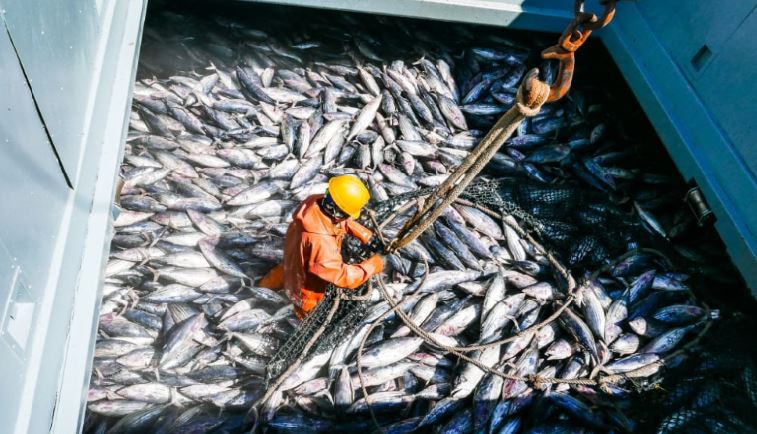Marine protected areas have ‘little impact’ on tuna stocks
Friday 20 January 2023 | Written by RNZ | Published in New Zealand, Regional

Frozen skipjack tuna being loaded onto a carrier vessel in the Federated States of Micronesia. Photo: Francisco Blaha/23011910
No-take marine protected areas in the western and central Pacific Ocean appear to offer no benefit to tropical tuna conservation according to a new study published in Frontiers in Marine Science. By Caleb Fotheringham, RNZ Pacific journalist.
The paper’s lead author and chief fisheries scientist at the Pacific Community, John Hampton, said tuna such as skipjack and bigeye have a wide distribution in tropical and sub-tropical waters of the Pacific.
He said the tuna species are capable of spawning anywhere where the water temperature is greater than about 25°C.
“Their larvae drift in the surface water currents, and as they grow they are able to move widely through the region,” Dr Hampton said.
“So, closing off one part of the area tends not to offer much if any protection to species like this.”
He said when areas are closed to fishing the vessels don't disappear but just fish somewhere else in the Pacific.
Dr Hampton said many marine protected areas were set up under the assumption there would be a positive effect on tuna stocks.
“There's quite a lot of enthusiasm for these things in certain circles, what we're saying is that expectations have to be realistic and certainly in the case of tuna don't expect there to be large sorts of conservation gains.”
The study found the Phoenix Islands Protected Area (PIPA) in Kiribati – covering close to double the area of New Zealand - had a negligible impact on the conservation of skipjack and bigeye tuna.
The Kiribati Government has decided to re-open the area to tuna fishing from this month.
The paper’s co-author, Kaon Tiamere of Kiribati Ministry of Fisheries and Marine Resources Development said the Ministry had been concerned that over the past eight years the PIPA closure to fishing had negatively impacted Kiribati foreign tuna vessel licence fee revenue, which is a crucial source of income.
“These losses are difficult to justify if, as these new analyses suggest, there is little tuna conservation benefit resulting from the PIPA,” Tiamere said.




















































